M. Karunanidhi
This is a collection of articles archived for the excellence of their content. |
The man
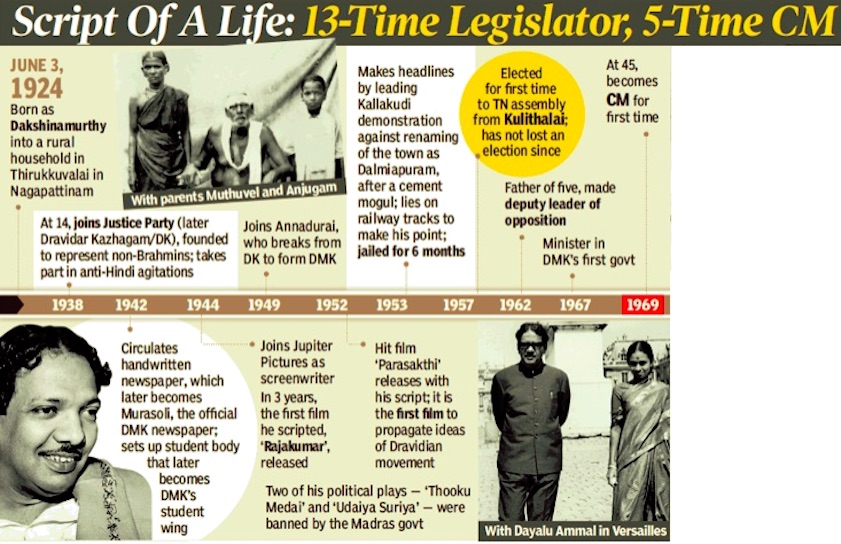
From: August 8, 2018: The Times of India
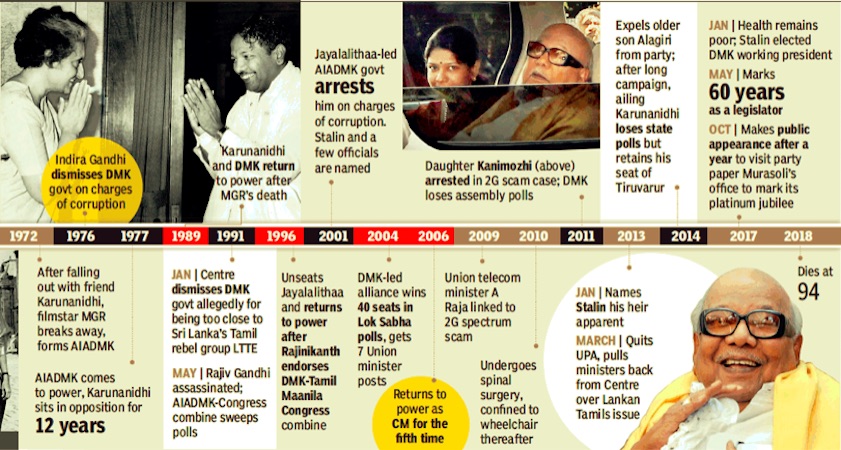
From: August 8, 2018: The Times of India
See graphic:
M Karunanidhi- A brief biography, 1938-1969
M Karunanidhi- A brief biography, 1972-2018
A significant role in coalition governments, 1977-2016
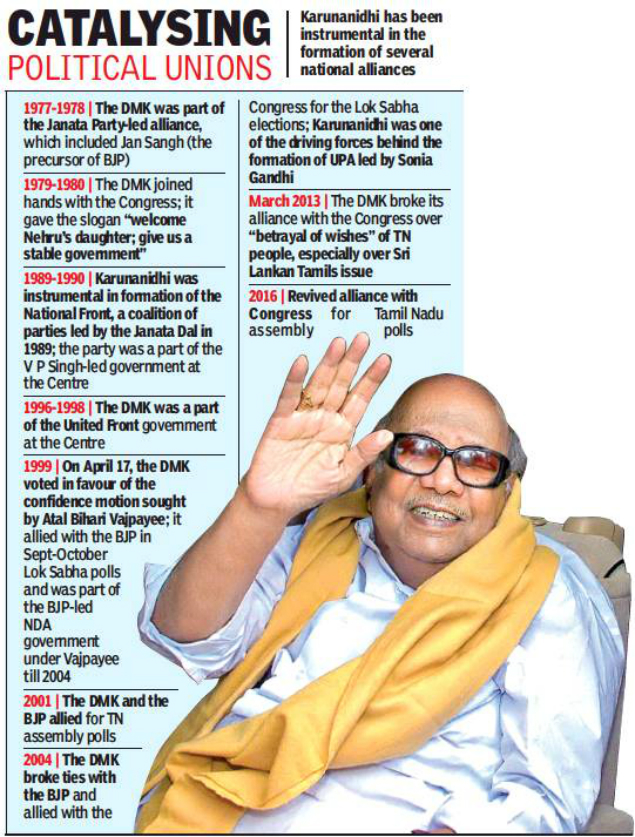
From: R Kannan, M Karunanidhi: Dravidian satrap who aced the game of coalition politics June 4, 2018: The Times of India
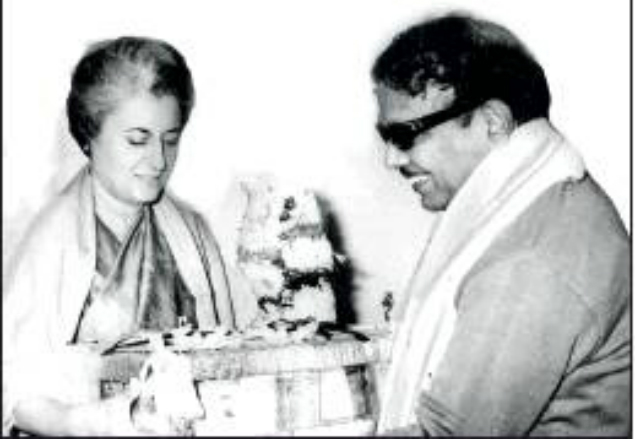
From: R Kannan, M Karunanidhi: Dravidian satrap who aced the game of coalition politics June 4, 2018: The Times of India

From: R Kannan, M Karunanidhi: Dravidian satrap who aced the game of coalition politics June 4, 2018: The Times of India
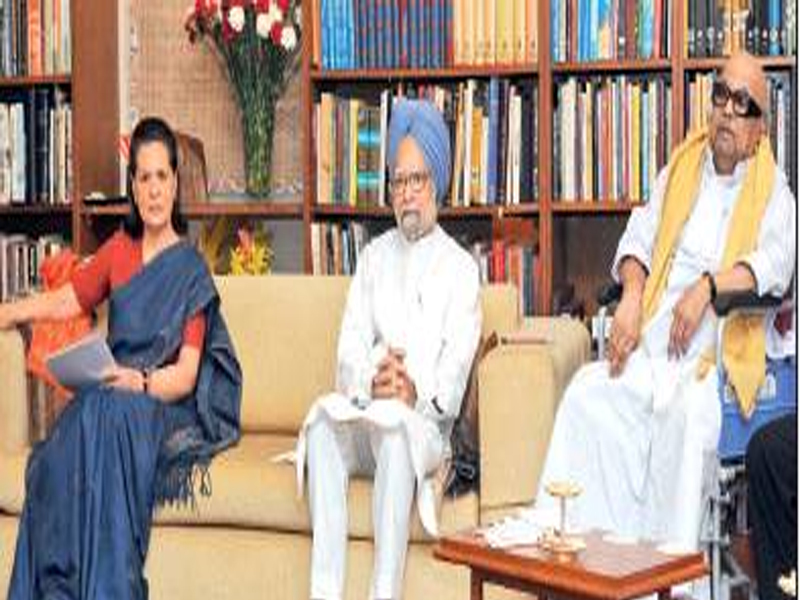
From: R Kannan, M Karunanidhi: Dravidian satrap who aced the game of coalition politics June 4, 2018: The Times of India
HIGHLIGHTS
Karunanidhi, a regional leader who made himself indispensable to India’s national political trajectory from the late 1960s until recently.
Be it helping Indira Gandhi to consolidate power, facilitating national alliances or extending support to the NDA and the UPA, Karunanidhi hands were seen in nationally momentous occasions.

From: August 8, 2018: The Times of India
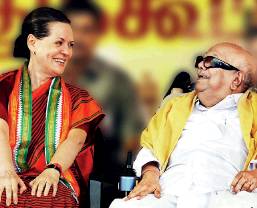
From: August 8, 2018: The Times of India
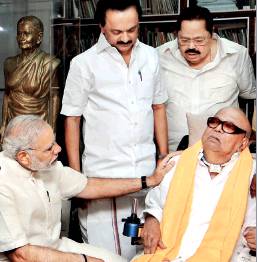
From: August 8, 2018: The Times of India

From: August 8, 2018: The Times of India
On February 10, 1969 Karunanidhi stepped into C N Annadurai’s large shoes as chief minister. "I have heard that he is a confrontationist," Prime Minister Indira Gandhi had remarked then. But Karunanidhi didn’t let his Dravidian credentials stanch his ambitions for the DMK.
Hedging his bets carefully, he became the first chief minister to advocate bank nationalisation in 1969. It was a clever move. The Congress’ old guard was opposed to the idea and Indira Gandhi, who was yet to consolidate her position, was not too sure about such a gamble. But, Karunanidhi had sensed that Gandhi would emerge victorious in the intra-Congress fight for power and that a regional satrap pronouncing such a national policy was strategic. As Karunanidhi himself recalled later in 1994, the DMK with its feet firmly in Tamil Nadu, "had extended its hands nationally." On July 19, 1969, Indira Gandhi announced bank nationalisation. She was an ally of the same "confrontationist" Karunanidhi.
This was Karunanidhi, a regional leader who made himself indispensable to India’s national political trajectory from the late 1960s until recently. Be it helping Indira Gandhi to consolidate power, facilitating national alliances or extending support to the NDA and the UPA, his hands were seen in nationally momentous occasions.
To weaken Kamaraj’s potently strong Congress in Tamil Nadu, Karunanidhi helped build the breakaway Congress faction led by Indira Gandhi. He stood by Gandhi when she chose to field her own presidential candidate in 1969 against the official candidate. His talks with the chief ministers of Punjab and West Bengal led to a consensus and Karunanidhi made the official announcement on V V Giri’s candidacy in Madras.
After the DMK’s victory in the 1971 elections, Karunanidhi articulating the party’s goals for stronger states, on 29 March 1971, said "I believe no one in India would wish to create a Mujibur Rahman in each state." Meanwhile, he joined hands with the opposition and addressed a social justice conference in 1973 in the north. This, he records, was resented in Delhi.
The split in the DMK by MGR in 1972 was a major political setback. But the worst was yet to come. During Emergency (1975), the DMK government was dismissed, more than four hundred DMK cadres were interned and DMK leaders feared that the party would be banned. Among the arrested was Karunanidhi’s son M K Stalin and nephew Murasoli Maran.
Karunanidhi’s opposition to Emergency built bridges to Jayaprakash Narayan. In the post-Emergency period, he would host leaders from the north in Delhi – a meeting that led to the birth of Janata Party that felled Indira Gandhi in 1977. The Janata experiment, however, turned out to be a huge disappointment. The DMK later joined hands with the Congress in 1980, only to part ways in 1983 over the Sri Lankan Tamils issue
Karunanidhi’s relationship with the opposition was such that he could bring N T Rama Rao and A B Vajpayee under the banner of the Tamil Eelam Supporters Organisation (TESO) in Madurai in May 1985, to show solidarity with the Sri Lankan Tamils.
When V P Singh broke company with Rajiv Gandhi, Karunanidhi rallied behind Singh, playing a substantial role in the formation of the National Front. The implementation of the Mandal Commission, the return of the Indian Peacekeeping Forces and the constitution of the Cauvery Tribunal should all be credited to Karunanidhi’s friendship with Singh.
After Singh’s exit, Karunanidhi was instrumental in the choice of Deve Gowda and I K Gujral as prime ministers. In 1999, he propped up the National Democratic Alliance government led by the BJP’s Atal Bihari Vajpayee. The coalition helped in TN’s development, but he deftly ended the relationship in 2004 sensing it as a political liability. Soon he was one of the driving forces behind the United Progressive Alliance led by Sonia Gandhi. In return Sonia Gandhi treated Karunanidhi as their alliance’s Bhishma, and at one-point Tamil Nadu had the highest contingent of ministers. But, in March 2013 the DMK pulled out of the UPA government.
It is amazing that Karunanidhi, a high school dropout with no knowledge of Hindi, had often taken centre stage nationally and moved with ease with northern leaders. But then he himself is no ordinary leader. A stage artist, script writer, speaker, organiser, poet, administrator and journalist — Karunanidhi is an extraordinarily endowed leader. And at 94 he stills remains one.
(The writer is the deputy head of the UN Assistance Mission in Somalia’s Hirshabelle office)
Reminiscences of those who worked with him
R Poornalingam | Former Home Secretary
'Wanted tomorrow's work yesterday'
While it was a pleasure to work with Mr K, it was equally tough and demanding. He would expect tomorrow's work to be executed yesterday. For that, he worked so hard that no one could meet his expectation.
He was always willing to listen to differing points of view. Once he was deciding on the case of a political nuisance maker, when I, as the home secretary, was present. A few minutes after his decision, he could see I was not agreeing with him. He asked my views, which were opposite to his; not only did he agree with me, but also immediately countermanded his orders.
Another incident that touched me was when I was the chairman of Tamil Nadu Electricity Board. The board had increased the new connection charges from Rs 350 to Rs 1,000. When the electricity demand was being discussed in the assembly, the opposition objected to the sharp increase. The CM walked up to the officers' gallery and asked me whether the amount could be reduced to Rs 500. Naturally I was reluctant, but he bargained with me and settled for a reduction of Rs 300. There was absolutely no need for him to consult me. As the CM, he could have simply announced. It is his willingness to respect his subordinate's views which was touching.
K Thirunavukarasu | Dravidian historian
Never compromised
During Emergency, where there was a lot of pressure from the Centre on him as chief minister of Tamil Nadu to do certain things, Thalaivar refused to compromise. As a result many DMK leaders were arrested and sent to prison for nearly a year.
One of the demands on all state parties was to change their party names either to add India at the start or at the end. It was during this period that AIADMK founder M G Ramachandran changed the name of his party from Anna Dravida Munnetra Kazhagam to All India ADMK.
Within DMK too, many senior leaders asked Thalaivar to change the name of the party and make it an allIndia party. But Thalaivar refused. He said DMK was founded by C N Annadurai for the sake of Tamil people and culture. He refused to change the party's name and said he was ready to face anything from the Centre.
Kamal Haasan | Actor
When I got in character to pose
When I was acting in `Sattam En Kayil' (1978), director T N Baalu told Kalaignar about me. During the 100-day celebration of the film, I got an opportunity to sit next to Kalaignar. Whenever I acted in a good film, I always longed to screen it for Kalaignar. Our relationship grew stronger to the point that when I did not show him my film, he would ask me why. The high point was when I went to his home dressed as the `Avvai Shanmughi' character and posed for photos with him. After watching `Dasavatharam' (2008), he pinched my cheeks in appreciation. When I was writing 'Dasavatharam', he suggested several ideas. He is not just a senior political leader or a Tamil scholar, but also a wonderful screenplay and dialogue writer.
Once, on his birthday, he asked me why I had not visited him and told me that he did not have a lot of time left. I told him there was time and that I would visit him. This was when he was 84, now he is 94. Vazhga Kalaingar (long live Kalaignar)
K Veeramani | Dravidian Kazhagam president
Those days of our youth
My relationship with DMK president M Karunanidhi goes back 70 years, when we were students. During summer holidays we used to join Periyar's training school in Erode and once, after a function, we stayed over at a member's house in a village near Thiruthuraipoondi, in undivided Thanjavur district. We were both tired but mosquitoes kept Karunanidhi awake, while I slept through it. Around 1am, he woke me up and said he wanted to leave for the next stop Thiruthuraipoondi.In the dead of the night; we found an open bullock cart and along with two others set off. We reached our friend's house in Thiruthuraipoondi at 3am. But not wanting to wake him up, slept on the sitouts. In the morning when the householders found us on the sit-outs they were astonished. Another time he attended a Periyar conference near Trichy when he had small pox.
Raadhika Sarathkumar | Actor
Challenged to get the best
I acted in many films written by Kalaignar including `Paasa Paravaigal' (1988) which had difficult dialogues.When I was practising the lines for a court scene in the film, I noticed he had a note for me in the script that read, "If Raadhika finds these lines difficult to recite, please change it to suit her". I thought I should do better than what he would have expected. The dialogue was long and had to be taken in one shot. I delivered it with a slight change. I think he was challenging me through the note to ace it and I did. When he spoke about it on stage years later, he said, "There is not much Raadhika cannot do, I penned the lines with the confidence that she will deliver."
Away from the arc lights, I have seen Kalaignar when he won and lost elections.In the 2001 TN assembly elections DMK suffered a humiliating defeat. I was at his Gopalapuram residence when the election results came out. He remained silent for 10 minutes then he went around consoling party members.
Lyricist Vairamuthu remembers this indomitable spirit when the Centre dismissed the DMK government in 1991.When the news reached the leadership; the ministers were dejected and asked Kalaignar to cancel a scheduled conference of the state teachers association. I was there when Kalaignar told his party men, "It is now that we have to meet the people more than ever."